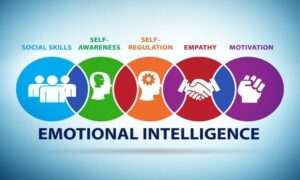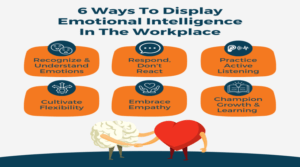Lack of emotional regulation skills can result in a variety of symptoms, such as hopelessness and depression, which are harmful to mental health while dealing with
causes of compromised emotional intelligence:
Lack of self-awareness
Lack of stress management techniques
Persistent negative thinking
Lack of emotional support like toxic relationships, absence of a support system
Past traumatic experiences
Mental health issues
Social and cultural effects
Environmental stressors
Lack of knowledge, such as how to become emotionally strong
Components of becoming emotionally strong:
Empathy for others: Recognizing not only your own emotional needs but also the needs of people around you might aid in your ability to read crucial clues in social situations.
Ability to preserve wholesome relationships: Relationships can become more fruitful and functional with clear communication and positive influence from both words and deeds.
Myths vs. facts related to becoming emotionally strong for parents & adults:
MYTH: Emotional intelligence means being emotional.
Fact: It isn’t about having your feelings on tap or pulling an emotion out of your hat. Everyone has emotions. EQ teaches you how to recognize and work with them, building good self-management skills for working with others.
MYTH: High EQ people don’t experience emotional struggles.
Fact—everyone struggles with emotions.
MYTH: Women are more emotionally intelligent. Men are more emotionally intelligent
Fact: EQ doesn’t have a gender bias and having it doesn’t mean you are a more emotional human.
MYTH: Emotions don’t belong in the workplace!
Fact: Employees with high emotional intelligence are skilled at handling difficult coworkers and clients, operate from integrity, have a strong social repertoire, and show compassion to themselves and others.
Communication for enhancing emotional intelligence
Training Programs
Workshops and Seminars: Regularly planned workshops covered empathy, self-awareness, and interpersonal skills.
Simulation training: involves role-playing and simulation activities to practice emotional reactions in various clinical scenarios.
Mindfulness Practices: Training in mindfulness and meditation to help healthcare providers stay present and manage stress.
Support Groups: Creating peer support groups where staff can share experiences and strategies for managing stress.
Family Engagement: Techniques for empathetically interacting with patients’ families, providing clear communication and emotional support.
Useful tips on how to become emotionally strong:
Playing an instrument
Playing an instrument is a fun and creative way to boost your intelligence. It involves skills like:
– Auditory perception
– Physical coordination
– Memory
– Pattern recognition
Emotional Diary: Maintain a diary to document your everyday feelings and consider what sets them off.
Yoga: Yoga is beneficial for both physical and mental health.
Daily Meditation:
Practice silent meditation for ten to fifteen minutes every day. Pay attention to your breathing while objectively observing your thoughts. Emotional control and self-awareness can both be enhanced by this practice. There are many ways to meditate. You can:
- Use meditation apps
- Listen to guided meditation videos
- Attend a meditation class
How to become emotionally strong through regular physical activity
Frequent Exercise: Engaging in frequent physical activity can lower stress and elevate happiness. Beginner-friendly exercise ideas include:
• walking
• yoga
• hiking
• bodyweight workouts
• Make time to sleep.
these regular exercises not only help to reduce stress hormone levels in the body but also make you learn how to become emotionally strong.
Enhancing emotional intelligence through diet
A balanced diet should consist of lean meats, fruits, vegetables, whole grains, and other nutrients. Enjoy a cup of green tea. Drinking green tea can also improve cognitive performance. Tea’s moderate caffeine level is thought to contribute to some of its benefits.
- Consume nutrient-rich meals.
Another way to enhance brain health is to eat meals high in nutrients that support brain function. Fatty acids from fish high in omega-3
• shellfish
• seaweed
• flax
• avocados - Nuts
Sufficient Sleep: if you want to learn how to become emotionally strong, you must understand the importance of sleep. You need seven to nine hours of sound sleep every night. Moreover, sleep is necessary to maintain the best possible cognitive performance. Your brain compiles the memories you make during the day while you sleep. It also improves the capacity of your brain to take in new knowledge when you awaken.


